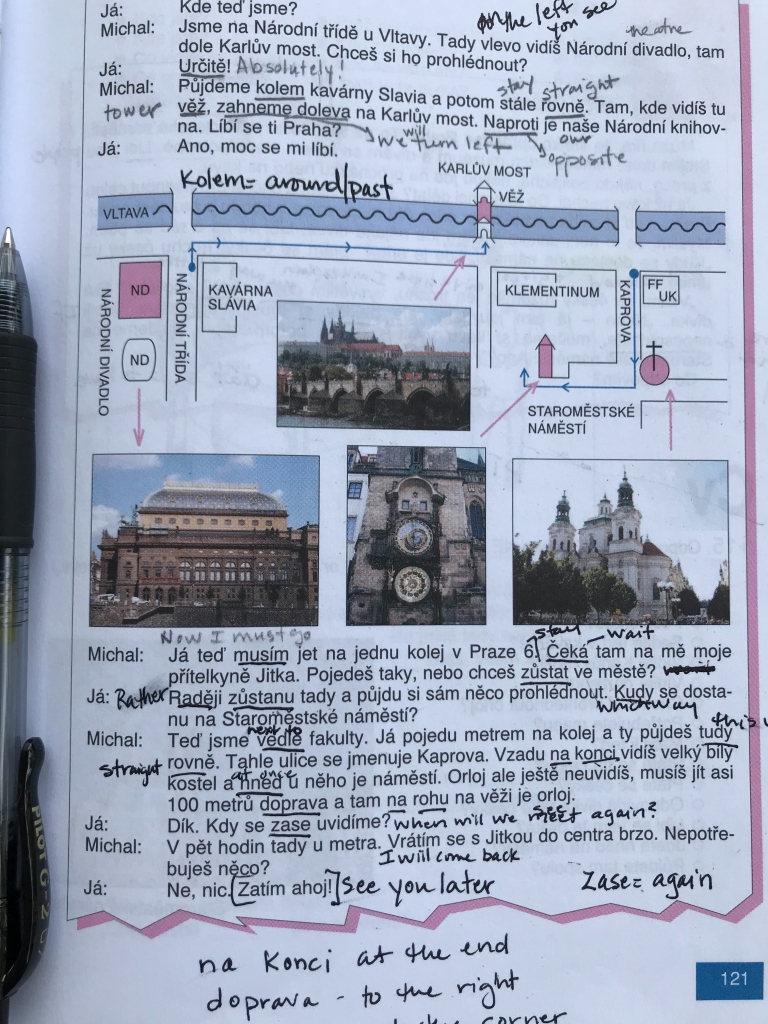If you assume that learning to speak Czech is difficult- you would be right. I have been working at it for two years now and am finally getting the hang of it. In the introduction to one of my Czech textbooks, the author marvels at how the Czech people have managed to keep their language alive and well during so many occupations of their homeland. He comes to the conclusion that it is due to their “Secret National Defense System,”
….. their language!

“I imagine that Czech was so difficult for the foreign invaders that they were unable to interact in a meaningful way with the Czechs”… and so they… “eventually tired of not being able to communicate much of anything, to anyone, they left, leaving the culture unaffected.” (401 Czech Verbs by Bruce Davies and Jana Hejduková)
The most difficult part of the language is its system of 7 different Cases in which nouns, adjectives, pronouns, and most numerals change their endings according to the Case used. The Cases define the relationship between words in a sentence, ie. who or what is the subject, direct object, or indirect object, etc. (Word order is not necessarily important in Czech but is crucial in English) For instance, here are some spelling changes for the word: doma which means home: “at home” is doma, “go home” jdi domů, “leave home” opustit domov, and “in the home” v domě.

I’ve made a few notes in my textbook! 
On the flip side, Czech is a phonetic language, which makes it easy to pronounce and spell- unlike English with all its silent letters like: “k” in knee, “b” in climb, “h” in hour, “w” in answer, and “gh” in thought. But more about the history and structure of English in another Post…
Did You Know That Queen Elizabeth I Spoke 9 Languages Fluently?

“She possessed nine languages so thoroughly that each appeared to be her native tongue; five of these were the languages of peoples governed by her, English, Welsh, Cornish, Scottish, for that part of her possessions where they are still savage, and Irish. All of them are so different, that it is impossible for those who speak the one to understand any of the others. Besides this, she spoke perfectly Latin, French, Spanish, and Italian extremely well.”
–Giovanni Carlo Scaramelli, Venetian Ambassador 1603
People often speculate as to which language is the most difficult to learn, usually assuming it’s the one that they speak. But difficulty is all relative. Relative to how similar the language is to your own (grammatically and phonetically), how well you learn in general, and of course, how motivated you are to learn it, among other things.
That being said, I checked out the Foreign Service Institute’s (FSI) ranking of world languages based upon their level of difficulty for native English speakers. The FSI provides training for U.S. foreign diplomats, so I figured they would know. They have divided languages into 4 categories with Cat 1 being easiest and Cat 4 labelled as “exceptionally” difficult. No surprise that Spanish and French fall into Cat 1 and that Arabic, Chinese, Japanese, and Korean are Cat 4. The bulk of the languages fall under Cat 3, which is where you will find Czech. (I won’t argue)
Of course, I am highly motivated to learn Czech as I plan to live and work in the country. But why should you learn to speak another language if you don’t plan to leave the U.S? Why should you be a polyglot (like Queen Elizabeth) and not a monoglot? Based upon my own experience, and with the help of Dr. Neel Burton, author of “ Beyond Words: The Benefits of Being Bilingual” (article appears in “Psychology Today” online July 2018), I would sum it up this way….

- It enriches your life. As Dr. Burton points out, multilingualism is closely linked to multiculturalism. As we investigate and learn another language we naturally come to know and appreciate that culture. Your understanding, empathy, and compassion will expand.
- It connects you to the world which is increasingly interconnected through the Internet and other technologies. Now more than ever before we travel, trade, and work with people and businesses around the world.
- It’s good for your brain health. Learning a foreign language is a great brain exercise that increases gray matter. It works the part of your brain that handles executive functions like analysis, problem solving, working memory, multi-tasking and attention control.

But, I suppose, there is a fourth, and very simple reason to learn a foreign language- it’s fun! How cool is it to be able to talk with another person in a second language? In my next post I will talk about tips for language study that have helped me.
Dear Readers, do you speak a foreign language? What has been your experience with learning another language? I’d love to hear about your language journey.



Interesting post about languages, and their differences in structure and pronunciation. Many years ago before going to Europe I listened to German and Czech tapes (back in the days of cassette tapes) while driving. I didn’t find it too difficult to pick up a bit of German to use while traveling, but I could not learn Czech. Even simple greetings did not stay in my brain. After meeting some distant CZ relatives, I was determined to learn some Czech when I came home but it did not happen. I still have those tapes, maybe I should try again… Good luck to you and I sure hope you get to realize your dream!
LikeLike
Oh Linda, I remember learning Spanish on those cassette tapes! German does have more similarities with English, and English has adopted many words of German origin- yes, I think you should pull out those old tapes and try again. The only problem might be finding a cassette player!
LikeLiked by 1 person
Always inspire me with your blog. Who knows “a new language at 75????
LikeLike
Sue, you’re never too old to learn a new language! In my next post I’m going to talk about some ways you can make it easier to do
LikeLike
I’ve been taking Czech language lessons for a year. Lots of new words to learn but i think the hardest is knowing when to change the ending of a word to fit the declension/case situation.
LikeLike
That’s great Barb. Are you studying as part of a class or with an individual instructor? I’m in a Zoom class at present but would like to find an individual teacher. Yes, 7 cases is extremely difficult! Not to mention the imperfect and perfect forms of the verb!
LikeLike